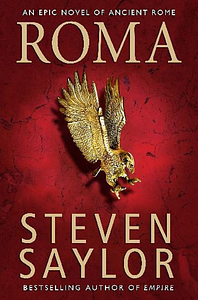Take a photo of a barcode or cover
informative
reflective
slow-paced
Plot or Character Driven:
Plot
Strong character development:
No
Loveable characters:
No
Diverse cast of characters:
No
Flaws of characters a main focus:
No
adventurous
emotional
tense
slow-paced
Seriously flawed, with a writing style that can be painfully plain, and yet oddly compelling! I was surprised at how much I enjoyed this book despite its obvious history lesson portions and its nearly nonexistent style. I was sad when it ended!
Reminded me a lot of the Rutherford style of book.
Saylor copies [a:Edward Rutherfurd|16204|Edward Rutherfurd|http://photo.goodreads.com/authors/1206127588p2/16204.jpg]'s idea of telling the history of a city or a nation by tracing one family. The problem is, he isn't as good as Rutherfurd is. Most of the characters, especially the women, are one dimensional. In addition, he makes Cleopatra boring. That's hard.
I can’t remember how this ended up on my to-read list. I think it was mentioned somewhere as s great book about Rome.
I can’t say I was that impressed. Yes, i learned a few things I didn’t know, but the characters were more incidental. There’s not a lot of depth of character development. They’re just there so that the book doesn’t read like a textbook.
I won’t be reading the next book in the series.
I can’t say I was that impressed. Yes, i learned a few things I didn’t know, but the characters were more incidental. There’s not a lot of depth of character development. They’re just there so that the book doesn’t read like a textbook.
I won’t be reading the next book in the series.
Saylor employs the time-worn but effective vehicle of two family's fortunes to carry the load of a millennium of Roman history. From its founding myths to the end of the Republic, Roma provides a vast, broad, but shallow view of the city and the world it came to dominate. Choosing to focus on the lives of individual members of the fictional Pinarii and Potitii families as the generations pass in and around the city, Saylor denies us a front-row seat at the events that shaped Rome's rise to domination of the Western world. Epic events from the battles of the Punic Wars to Caesar's conquests are related to the reader through the conversations and exposition of the characters, giving the novel at times the feel of a stage play.
Nonetheless, Saylor deserves a golden diadem himself for taking on the arduous task of condensing a thousand years of history into a few hundred pages. The pace is brisk, the characters often well defined and memorable, and Saylor's schematic maps of the city's growth over the ages help establish Roma firmly in the imagination. If you have an interest in Rome, and want to gain a feeling for life and politics in the greatest city of the ancient world, then you must read Roma.
A disjointed, overlong epic ... with more to come...
There is probably no better word that can be used to describe this novel other than "epic." The book starts from the beginning of the Roman culture and moves into the famous Roman empire that everyone is so familiar with by jumping across historic periods and providing stories for more important and well-known portions of ancient Roman history. The stories revolve around two families that were both equally important and renowned in ancient times, but one has fallen out of favor due to an act perceived as betrayal and shame. It's a great read for someone who likes to read histories and is alright with not fully following through with each of the characters.
Interesting way to learn about the history of the Roman Empire through a series of short historical fiction narratives. It was good, but not quite as well written as a Ken Follett historical fiction novel.



